Many of your AstraZeneca vaccine questions answered
Hello friends!
I am pleased to present some good news this week!
As always, I appreciate you passing this newsletter on to family and friends. I hope to educate more people weekly. There is so much nonsense, mythical noise out there, and I hope to provide some evidence-based information in an easily digestible way.
We’ll start with the bad news, followed by the good news. I will answer the most asked question of the week and end with my weekly silver lining.
The bad news
Over 161 million cases of COVID-19 had been reported around the world. The reported global death toll stands at more than 3.3 million.
Canada has reported over 1.3 million cases with almost 25,000 deaths.
Premier Doug Ford announced the stay-at-home order currently in Ontario will be extended until at least June 2.
Cases in Manitoba and Nunavut are rising, and BC, Saskatchewan, Ontario and Quebec are grumbling along.
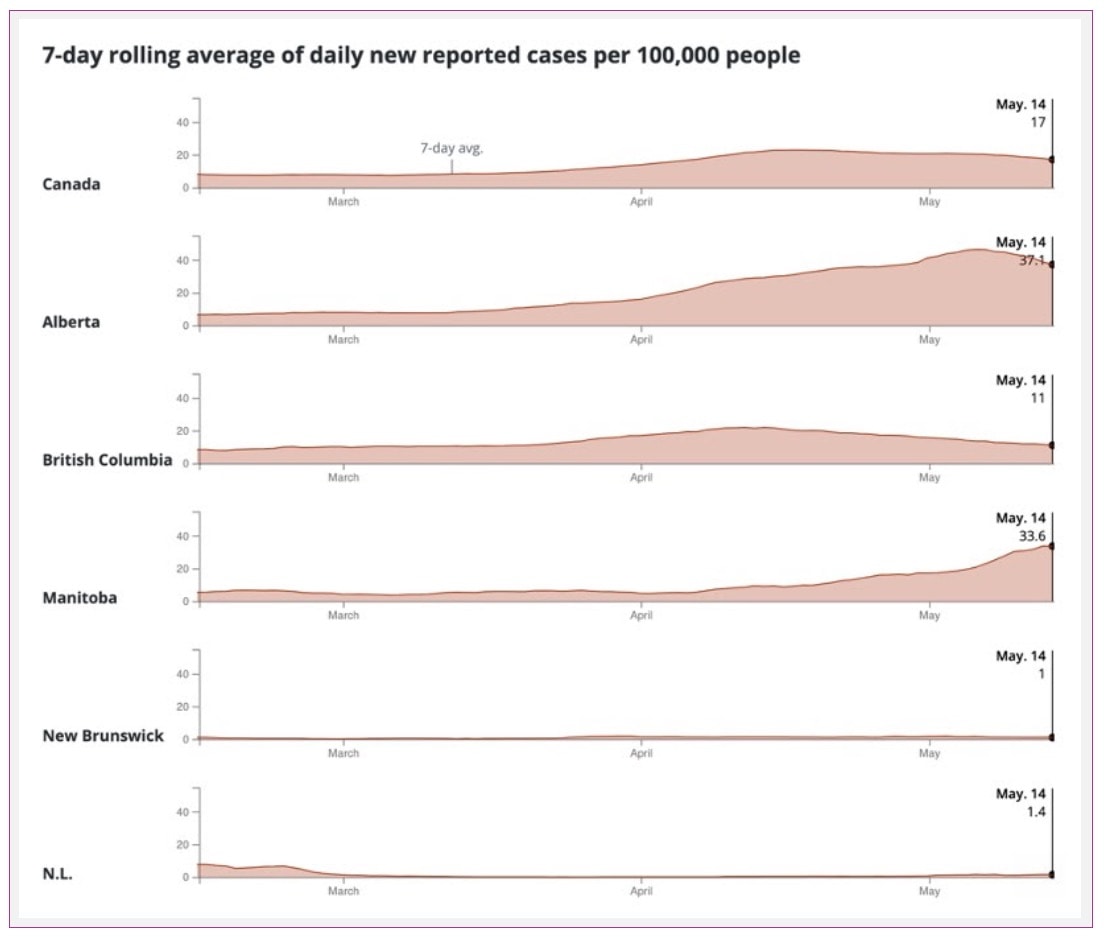
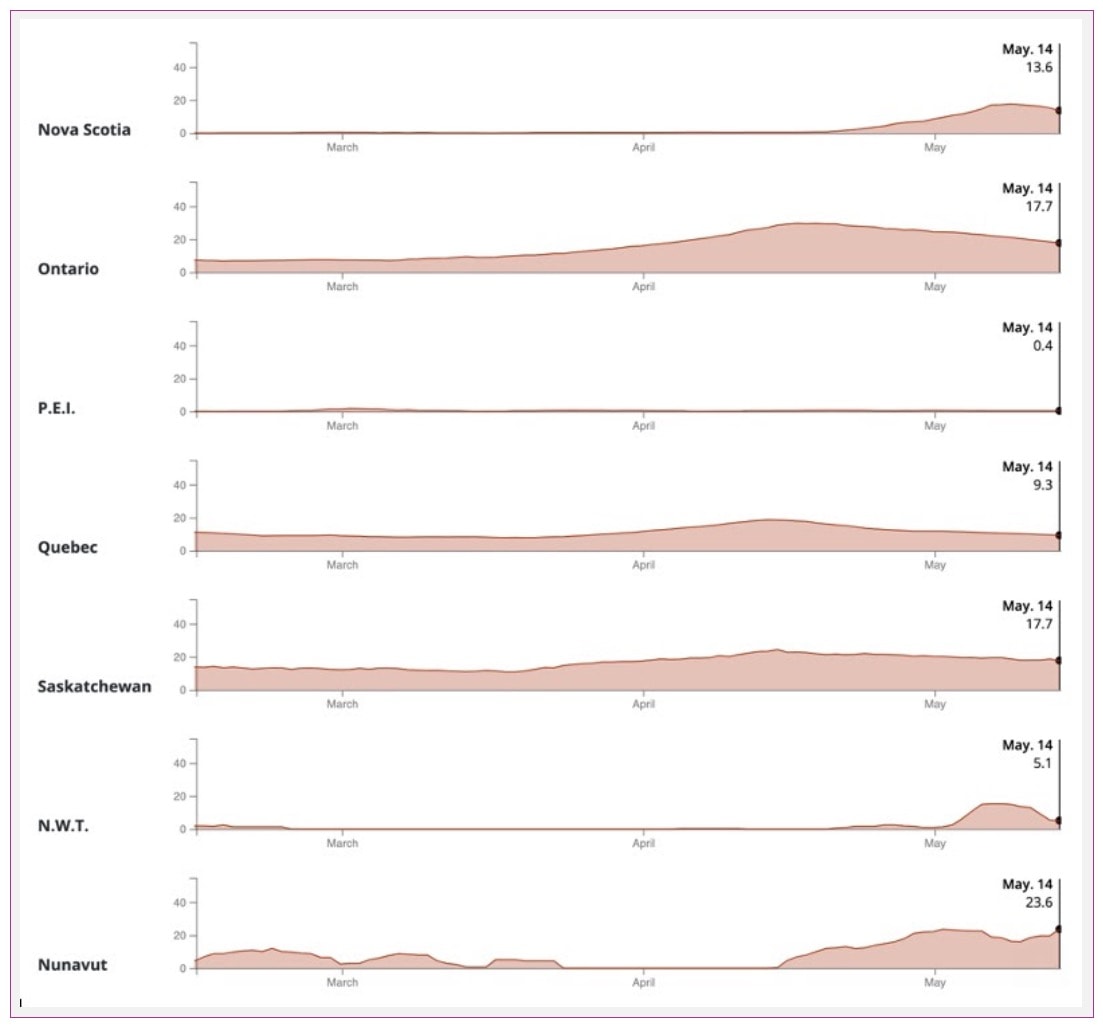
The good news
There are hopeful signs that we are coming over the peak of the third wave. There are fewer positive cases each week, admissions, and critical illness are also coming down. As a province, we avoided the worst-case scenario of numbers of new cases. The downward trends in death, hospitalization, and COVID-19 positivity rate are positive signs that we are getting COVID-19 under control.
The progress made in vaccinating against COVID-19 is impressive. In Ontario, more than 50% of adults have had at least one dose of the Vaccine. Notably, a higher percentage of people in hot spot communities have been vaccinated than in non-hot spot communities.
The Ontario government announced that anyone 12 years and older will be eligible to receive a vaccine starting May 31. More vaccines lead us closer to controlling the pandemic.
Worldwide, a lot of countries are starting to turn the corner, though the situation in India and Brazil continues to represent a humanitarian crisis.
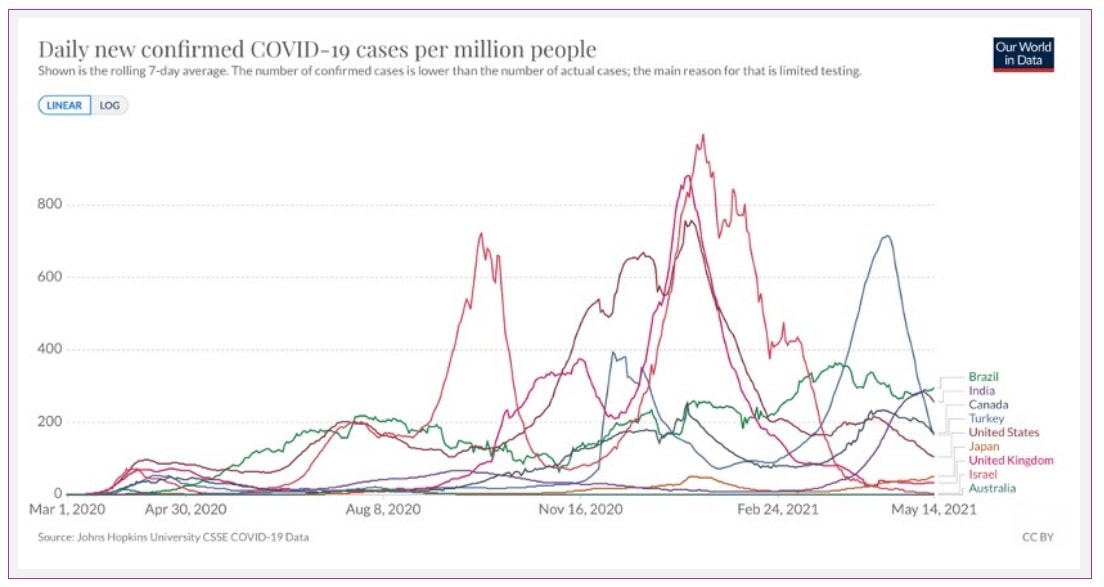
The most common question of the week:
What is happening with the AstraZeneca vaccine?
Ontario is pausing administration of the first dose of the AstraZeneca vaccine.
Here is what you need to know:
- All approved COVID-19 vaccines are similarly effective at preventing severe illness from COVID-19, including hospitalizations and death.
- The AstraZeneca vaccine has been associated with VITT (Vaccine-Induced Thrombotic Thombocypenia).
What is Vaccine-induced Thrombotic Thrombocytopenia (VITT)?
- VITT is a syndrome leading to reduced platelets and unusual blood clots.
- VITT affects around 1 in every 60,000 people who receive an AstraZeneca vaccine.
- VITT is rare and has better treatment and outcome when identified early.
- Symptoms of VITT may occur 4-28 days following AstraZeneca
- VITT is NOT seen with the mRNA vaccines (Moderna and Pfizer).
Are some people more likely to get VITT?
- We do not know if certain patients are more likely to get VITT. There is no evidence to date that VITT is more likely to occur in people who have had blood clots before, or who have a family history of blood clots, people taking birth control, those with autoimmune disease, low platelets, or platelet disorders, or pregnant individuals.
- VITT does not develop through the same process as other types of bleeding or clotting problems.
Will we need to use AstraZeneca vaccines in Canada in the future?
- We have enough mRNA vaccines to give to anyone 18 years of age and older who wants one within the next few weeks.
- If you received an AstraZeneca vaccine more than 28 days ago, you do not need to worry about VITT, and you are somewhat protected from COVID-19 severe illness and death.
- If you received one AZ vaccine, your next dose will likely be Pfizer or Moderna vaccine, though we are still awaiting details on that.
What do I do if I received the AstraZeneca vaccine less than 28 days ago?
- If you received an AstraZeneca vaccine between 4-28 days ago, you should know the signs of VITT.
- After vaccination, it is normal to feel tired, feverish, achy, and have soreness at your injection site. Those are not signs of VITT.
What are the Signs of VITT:
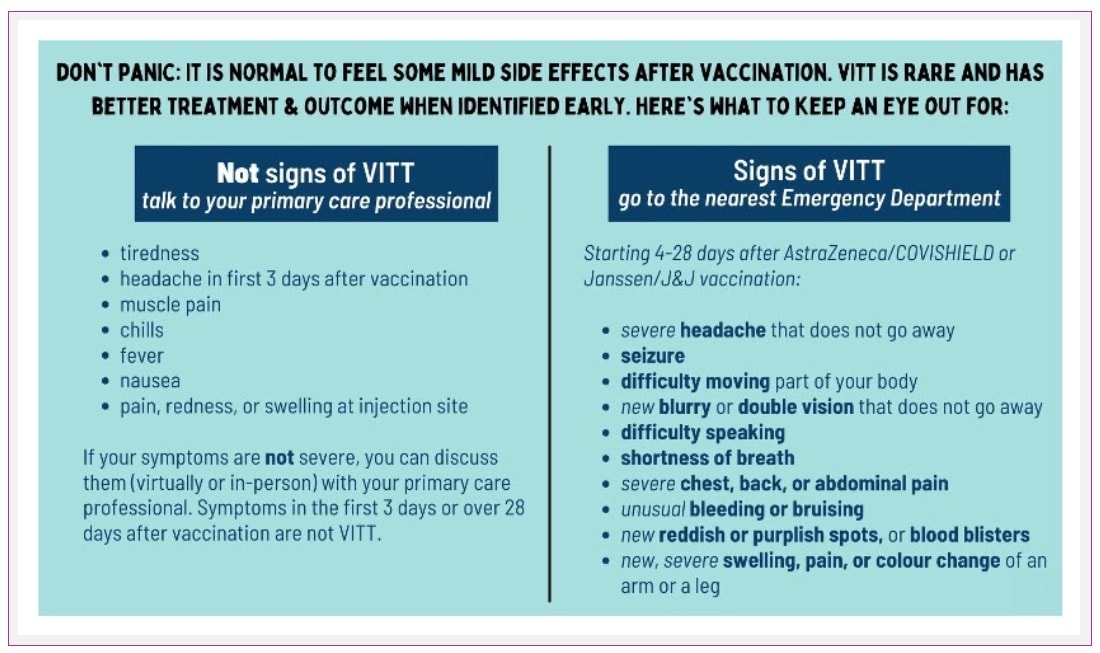
What should I do if I have concerning symptoms after the AstraZeneca vaccine?
If you have symptoms such as those listed above, you should immediately go to the nearest emergency department. Tell the emergency team that you received the AstraZeneca vaccine and tell them when you received it. When recognized early, VITT can be successfully treated.
And another common question:
Now that many people have received one Vaccine, how should we conduct ourselves now?
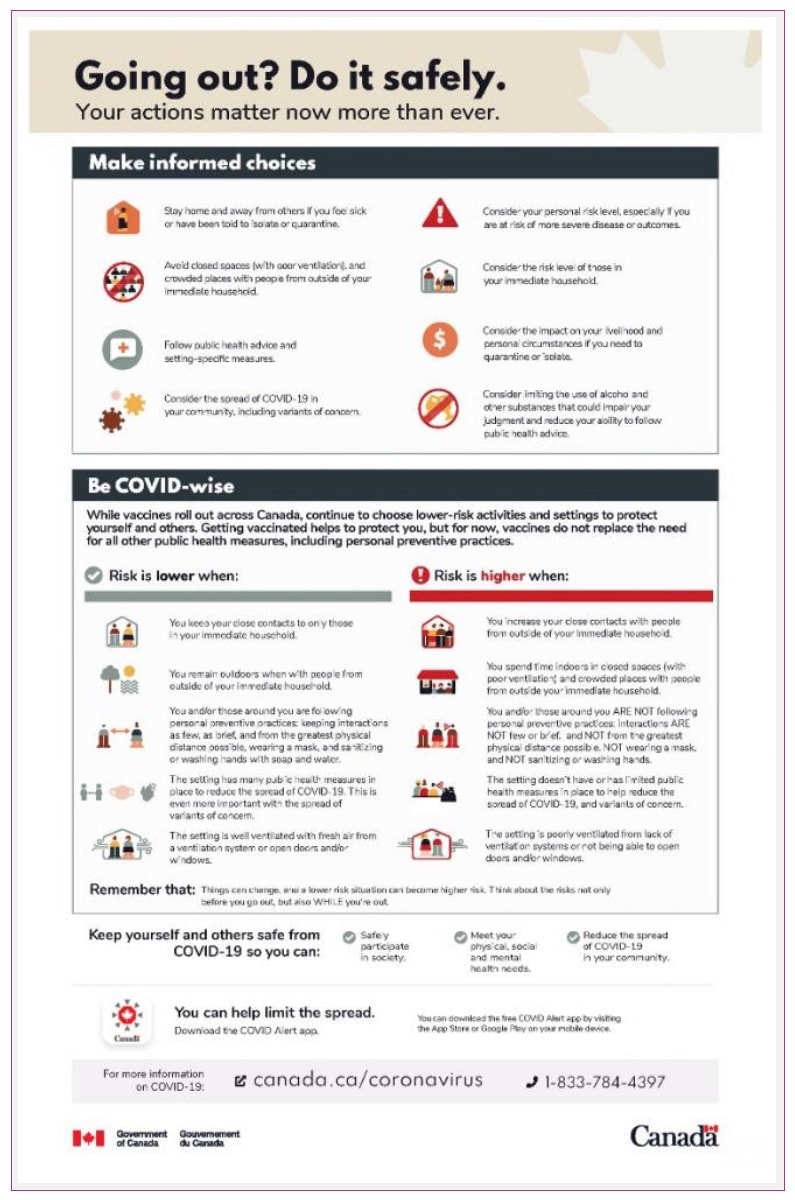
A reminder: if you received one Vaccine (or both), you might be protected from severe illness, but you may still carry and pass on COVID-19 to others. It remains crucial to wear a mask, continue to practice physical distancing, and wash or sanitize your hands frequently. Stay home if you or someone you live with is sick—even just a runny nose. We are almost there!
My silver lining of the week:
There is a light at the end of this crazy tunnel!
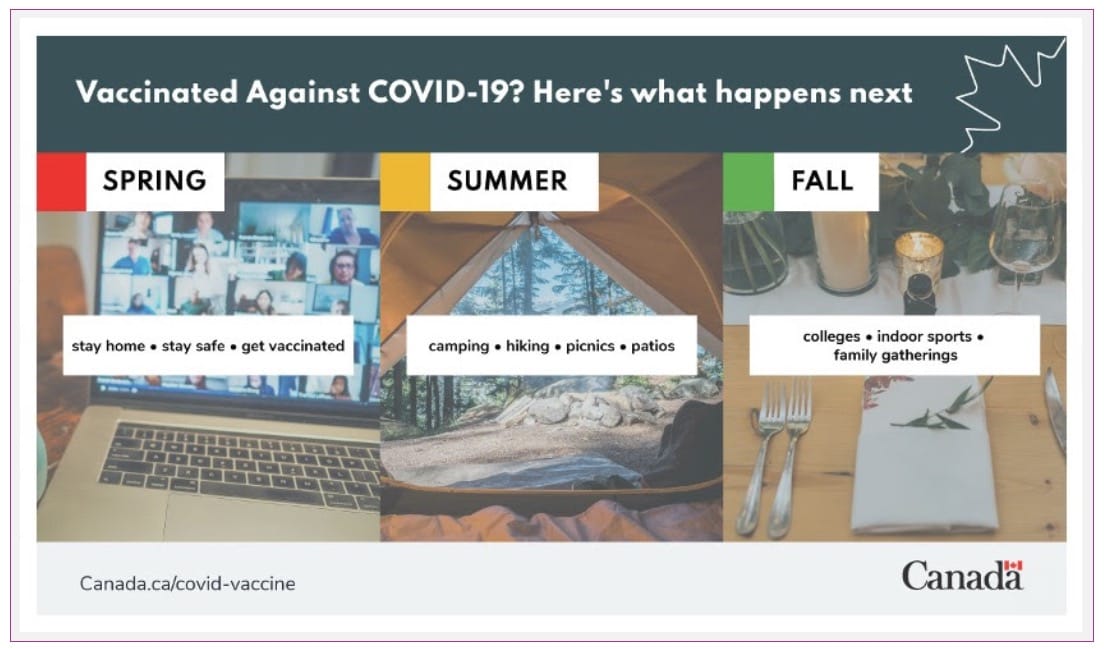
I hope you and your loved ones are healthy and safe!
Enjoy the sunshine!


![[Dr. Dina News] IMPORTANT UPDATE re. VIRTUAL CARE](https://drdina.ca/wp-content/uploads/2021/01/dr-dina-kulik-kids-and-virtual-care-1a-400x250.jpg)
![[Dr. Dina News] COVID-19 Vaccine for Infants and Young Children.](https://drdina.ca/wp-content/uploads/2021/04/dr-dina-kulik-kids-and-vaccines-400x250.jpg)
![[Dr. Dina News] COVID-19 Vaccine for Infants and Young Children.](https://drdina.ca/wp-content/uploads/2022/04/DRD-1-400x250.jpg)






